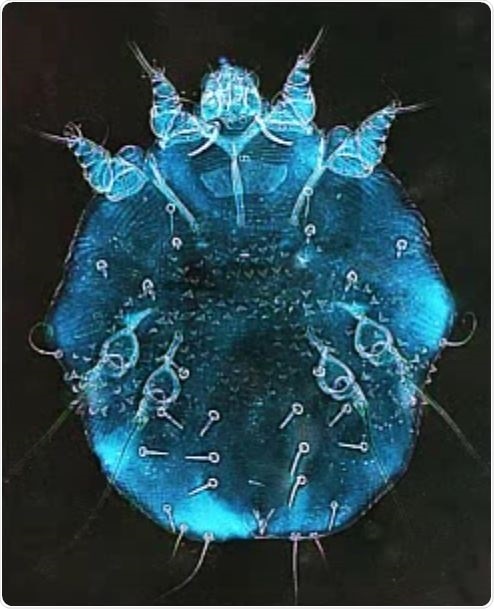The term scabies comes from a Latin word that means “to scratch”. The irritation caused to the skin by the rash is almost always going to make the baby want to scratch. The scabies rash on the skin looks like a pimple.
It is caused by microscopic mites that burrow into the epidermis of the skin and lay eggs. These parasitic mites spread easily from direct contact with an infected person. Scabies are often found in h ospitals and nursing homes because they provide the extended contact necessary for the mites to create scabies infestations.

What Causes Scabies?
The human itch mite, known in scientific terms as Sarcoptes scabiei var. hominis, is responsible for scabies infestation in human beings. The lumpy rash on the skin is caused by an allergic reaction that is triggered by the eggs and faeces of the mite embedded under the skin.
Norwegian scabies is a more severe form of the skin infestation that can develop in babies with a weakened immune system. The skin crusts over in a thick layer in this condition and the number of mites are greater than in a normal scabies infection.
Possible Signs of Scabies
The skin infestation can be tricky to identify as the symptoms of scabies can vary subtly from patient to patient. There are some common signs that you should pay attention to if you suspect your baby may have scabies.
- Bullae – raised, fluid filled lesions. The fluid is clear and the bullae are larger than about a centimetre in diameter.
- Papules – solid sections s of skin which are raised along a distinct border. Papules caused by scabies may be of about a centimetre in size.
- Pustules – fluid-filled spots on the skin . Unlike bullae, pustules have yellow fluid in the lesions raised from the skin.
- Vesicles – raised spots full of clear fluids. They may also be referred to as sac, cyst or vacuoles.
The appearance of the scabies infestation may differ, but all of them will cause a maddening itching. It also takes a while for an infected person to develop these symptoms as the infection may not have visible symptoms for four to six weeks despite the mites being present on the skin.
Treating Scabies in Babies
Babies with scabies will be prescribed a topical cream. Since the mites are extremely contagious it is necessary to cover all parts of the skin with the medicinal cream. This includes between the toes and in the skin folds along the thighs, underarms and between the fingers.
The cream will have to be applied and left on the skin for about eight hours before washing. Since babies tend to put their fingers in their mouth when they are awake, it would be a good idea to apply the cream at night and allow them to sleep, then wash it off when they wake up in the morning.
The medicinal cream most often prescribed include a number of different drugs. Not all combinations are safe to use on babies so get a prescription from your child’s doctor for the ointment best suited. A severe scabies infestation may merit some oral medication from the doctor as well.
Prognosis and Precautions
The scabies rash will ideally clear up between two to six weeks after treatment begins. The child is usually not considered infectious after the first full body medicated cream treatment is done.
The treatment should be repeated one week later, even if the skin has cleared up and the rash is no longer visible. The skin will continue to stay irritated for about three weeks even after the treatment has begun.
Cool compresses and calamine lotion can help ease the itching sensation for the child.
Preventing Scabies
A healthcare professional must be brought in to diagnose the type of scabies, the degree of skin exposure, and to determine the treatment method for the baby. Some facts to be kept in mind include:
- Scabies will spread by close physical contact with an infected person.
- By leaving scabies untreated the baby will suffer longer and more skin may get infected.
- Scabies can easily spread from the baby to other family members.
- Scabies mites can survive on the clothes and bedsheets of the baby for two days and stay infectious.
Treating scabies is the only way to get rid of the mites burrowing under the skin. It will not simply go away if ignored. Ensure that your baby is brought to the doctor as soon as you see the skin rash.
References
- CDC, Scabies, http://www.cdc.gov/parasites/scabies/gen_info/faqs.html
- Babycenter, Scabies in Babies, http://www.babycenter.com/0_scabies-in-babies_10904.bc?showAll=true
- The Royal Children’s Hospital, Melbourne, Scabies, http://www.rch.org.au/kidsinfo/fact_sheets/Scabies_symptoms_and_treatment/
- Scabies in a 2-month-old Infant Successfully Treated with Lindane, https://www.ncbi.nlm.nih.gov/pmc/articles/PMC2861204/
- https://www.youtube.com/watch?v=62sqE0tpu0w
Further Reading
- All Scabies Content
- Scabies – What is Scabies?
- Scabies Symptoms
- Scabies Treatment
- What are Norwegian/Crusted Scabies?
Last Updated: Feb 27, 2019

Written by
Cashmere Lashkari
Cashmere graduated from Nowrosjee Wadia College, Pune with distinction in English Honours with Psychology. She went on to gain two post graduations in Public Relations and Human Resource Training and Development. She has worked as a content writer for nearly two decades. Occasionally she conducts workshops for students and adults on persona enhancement, stress management, and law of attraction.
Source: Read Full Article